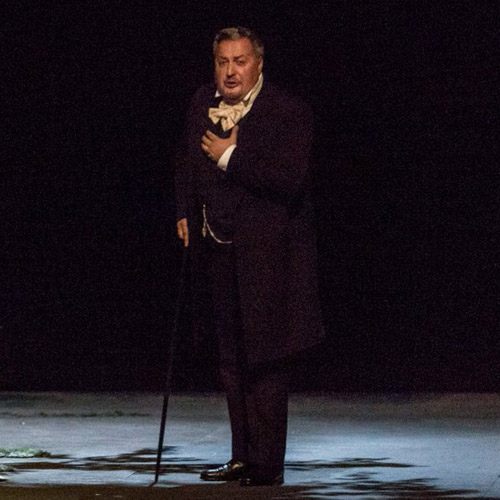
Review
|
13.11.2018
La Traviata – Paris Opera 2018
“It seemed like the role of Germont père was written for the Georgian George Gagnidze. Just like the role requires one could throughoutly enjoy noble Verdi singing after his fierce entrance scene.”
Sieglinde Pfabigan, Der Neue Merker
“Already at the beginning of the second act, Kurzak and baritone George Gagnidze, in the role of Giorgio Germont, were heavily acclaimed by the audience with sceams of “Bravi!”… (…)
It was thus the voices that raised the audience at the end of the performance, with reruns until October 26 and again between December 11 and 19, to thank Kurzak, Gagnidze and Jean-François Borras (Alfredo Germont), the sensitivity with which they embodied their characters.”
EFE, La Vanguardia
“It seemed like the role of Germont père was written for the Georgian George Gagnidze. After a fierce entrance, just as the role requires, one could throughoutly enjoy noble Verdi singing.”
Sieglinde Pfabigan, Der Neue Merker
“Already at the beginning of the second act, Kurzak and baritone George Gagnidze, in the role of Giorgio Germont, were heavily acclaimed by the audience with sceams of “Bravi!”… (…)
It was thus the voices that raised the audience at the end of the performance, with reruns until October 26 and again between December 11 and 19, to thank Kurzak, Gagnidze and Jean-François Borras (Alfredo Germont), the sensitivity with which they embodied their characters.”
EFE, La Vanguardia
“This Germont knows how to sing “Di provenza il mar il sol” dolce, and how to convince in his last phrases of remorse.”
Patrice Henriot, Opéra Magazine
“George Gagnidze sings a scrupulously nuanced Germont, with a finely modeled cantabile… .”
Didier van Moere, ConcertoNet
“George Gagnidze’s Germont is certainly traditional but effective…”
Alain Dualt, Opera Online
“To better achieve his goals and convince La Traviata to give up Alfredo, Giorgio George Gagnidze decided here to be immediately enveloping and caressing. He talks with his son using a very appropriate vibrato and his low notes are firmly set, even in the final tear of his remorse.”
Céline Wadoux, Olyrix
“George Gagnidze, (…), plays a severe Giorgio Germont, whose tone warms up as the character becomes human, which does not deprive him of being distressing during his duet with his son from the beginning.”
Audrey Bouctot, Forum Opera
“Giorgio Germont – George Gagnidze is a baritone who has been rightly acclaimed by the audience.”
Guy Courtheoux, Onsourtupas.fr
[Photo: Sebastien Mathé / Opéra national de Paris]
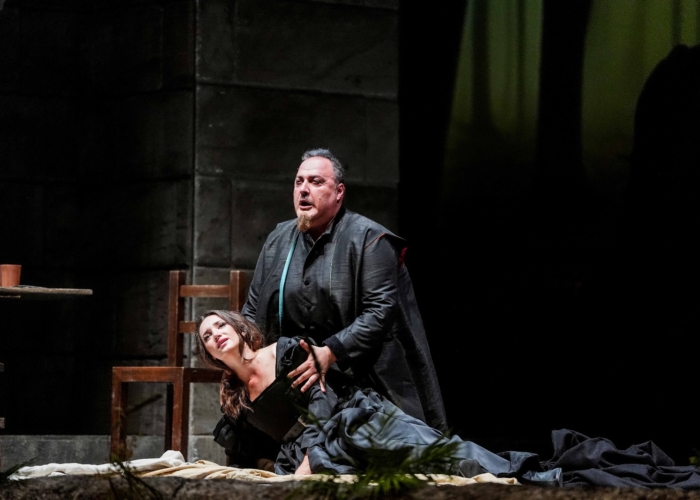
Review
|
15.11.2024
George Gagnidze is a “powerful, compelling, imposing” Rigoletto in Catania
"Giuseppe Verdi's opera conducted by an expert Verdian conductor. And the world of “courtiers” revolves around Gagnidze's voice.” "The poisoned world of ‘courtiers, vil razza dannata’ revolves around him, but he is the one who makes the scene-world revolve. And let us praise the Rigoletto of baritone George Gagnidze, Georgian, powerful, compelling, imposing Falstaff-like physique yet highly agile, mimetic, direct, ruthless, and broken. And what does it matter that he exhibits no mountainous humps or right-angle posture? His “diversity” is riveting and deadly. For everyone. He is a hypnotic “singing actor.” Gagnidze shows excellent declamation and phrasing and a remarkable word command. And all this is much more than a corollary to his expressive and happily “bulky” physicality that reminds one in no small part of Ambrogio Maestri, an immense exponent of the highest craftsmanship of theater in music.” “The magnificent “father” (of Gilda, ed.) Gagnidze!” Carmelita Celi, La Sicilia
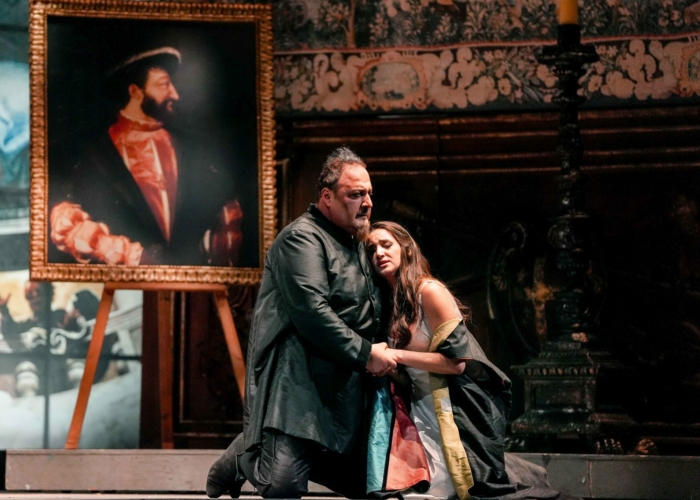
Review
|
30.10.2024
Interview with La Sicilia
On the occasion of his debut at the Teatro Massimo Bellini of Catania, George Gagnidze spoke with the largest Sicilian newspaper, La Sicilia:
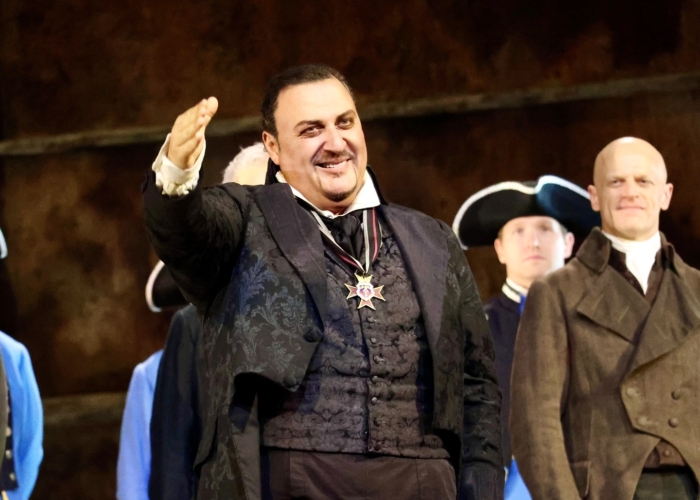
Review
|
25.10.2024
Press review “Tosca”, Metropolitan Opera 2024
“George Gagnidze as Baron Scarpia is Haunting” “OperaWire reported back in January 2023 about George Gagnidze singing his 100th performance of Scarpia in “Tosca” on Jan. 21, 2023. In a statement, Gagnidze said, “The role of Scarpia has been having a great impact on my entire career. Almost 20 years ago, I made my debut in this thrilling part when I was a member of the company of the Osnabrück Opera in Germany. I feel very privileged to have since then had the honor to perform this character on so many great stages and with some of the best conductors. Even though ‘Tosca’ is one of Puccini’s most popular and most performed operas, I think it is also one of these eternal masterpieces one can see on stage countless times and every single time it is gripping. For us singers it is the same on stage, and my 100th performance on Saturday at the Gran Teatre del Liceu will certainly be as thrilling for me as the previous 99 shows.” The Met Opera’s choice, for this season, to pair Gagnidze with Aleksandra Kurzak was an excellent decision. Gagnidze’s baritone is bone-chilling good. His voice rattles the soul and definitely caused a stir in Kurzak’s soprano during the “Tosca’s kiss” scene. Realizing Gagnidze’s greatness in this role is easy, however, recognizing the how deeply his castmates resonate with his performance is an infinite process. This is something I am still thinking about today. Gagnidze’s voice and presence as Scarpia is timeless, leaving zero doubt about how much he has processed this role beforehand. But, there is also a newness in his portrayal, especially as he is attacking Tosca and not expecting her “kiss.” Gagnidze has a gift for staying in the present moment and not getting ahead of himself. He is also (as I wrote above about Kurzak as Tosca) verismo personified. His aria, “Va, Tosca! Nel tuo cor s’annida Scarpia”, at the end of Act one with the Met Opera Chorus (celebrating a religious mass procession at stage right) and the orchestra including bell tolls, the newly restored Æolian-Skinner pipe-organ, and two canons, is absolutely my favorite moment in this production and with this particular cast. Gagnidze’s voice is breathtaking and terrifyingly honest as his Scarpia promises to “dig a nest in Tosca’s heart.” I could listen to this single moment again and again, the chorus was fantastic and the pipe-organ roared. Scarpia’s aria in Act two, “Tosca è un buon falco!”, resonated in Gagnidze’s voice as he contemplated exactly how to trap Tosca, busying himself about his Palazzo Farnese. The light fell gently in through the window behind him, illuminating his evil plot and realizing the graveness of his existence. Gagnidze voices Scarpia’s plan with fortitude and frivolousness. His plan’s exactness lacks love and therefore opens the gates of hell to devour him whole. Gagnidze dives headfirst into Scarpia’s insanity. This is more than just evil or satanic, Gagnidze was made for this role. This is verismo at its finest!” Jennifer Pyron, Operawire

Review
|
27.07.2024
Interview Platea Magazine: “Verdi siempre ha sido mi compositor favorito”
El barítono de origen georgiano George Gagnidze es bien conocido en nuestro país por sus notables interpretaciones de roles de Verdi y Puccini, singularmente. El próximo domingo 4 de agosto, el XVI Festival Lírico Ópera Benicàssim acogerá un recital en solitario con su voz, acompañado al piano por José Manuel Frasquet.
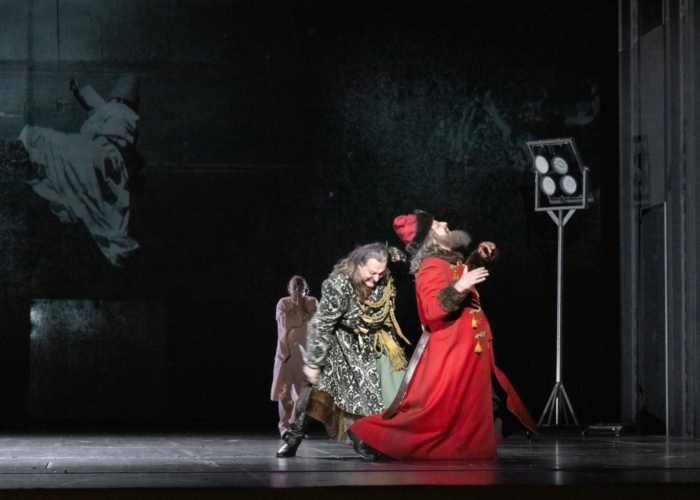
Review
|
27.06.2024
“George Gagnidze is outstanding as Shaklovity” in Berlin
Reviews are brilliant for the new production of Khovanshchina and George Gagnidze's Shaklovity at the Staatsoper Unter den Linden:




